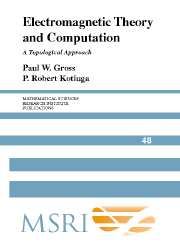Book contents
- Frontmatter
- Table of Contents
- Preface
- Introduction
- 1 From Vector Calculus to Algebraic Topology
- 2 Quasistatic Electromagnetic Fields
- 3 Duality Theorems for Manifolds With Boundary
- 4 The Finite Element Method and Data Structures
- 5 Computing Eddy Currents on Thin Conductors with Scalar Potentials
- 6 An Algorithm to Make Cuts for Magnetic Scalar Potentials
- 7 A Paradigm Problem
- Mathematical Appendix: Manifolds, Differential Forms, Cohomology, Riemannian Structures
- Bibliography
- Summary of Notation
- Examples and Tables
- Index
Mathematical Appendix: Manifolds, Differential Forms, Cohomology, Riemannian Structures
Published online by Cambridge University Press: 06 July 2010
- Frontmatter
- Table of Contents
- Preface
- Introduction
- 1 From Vector Calculus to Algebraic Topology
- 2 Quasistatic Electromagnetic Fields
- 3 Duality Theorems for Manifolds With Boundary
- 4 The Finite Element Method and Data Structures
- 5 Computing Eddy Currents on Thin Conductors with Scalar Potentials
- 6 An Algorithm to Make Cuts for Magnetic Scalar Potentials
- 7 A Paradigm Problem
- Mathematical Appendix: Manifolds, Differential Forms, Cohomology, Riemannian Structures
- Bibliography
- Summary of Notation
- Examples and Tables
- Index
Summary
The systematic use of differential forms in electromagnetic theory started with the truly remarkable paper of Hargraves [Har08] in which the space-time covariant form of Maxwell's equations was deduced. Despite the efforts of great engineers such as Gabriel Kron (see [BLG70] for a bibliography) the use of differential forms in electrical engineering is, unfortunately, still quite rare. The reader is referred to the paper by Deschamps [Des81] for an introductory view of the subject. The purpose of this appendix is to summarize the properties of differential forms which are necessary for the development of cohomology theory in the context of manifolds without getting into the aspects which depend on metric notions. We also develop the aspects of the theory that both depend on the metric and are required for Chapter 7. Reference [Tei01] presents most of the topics in this chapter from the point of view of the numerical analyst interested in network models for Maxwell's equations.
There are several books which the authors found particularly invaluable. These are [War71, Chapters 4 and 6] for a proof of Stokes’ theorem and the Hodge decomposition for a manifold without boundary, [Spi79, Chapters 8 and 11] for integration theory and cohomology theory in terms of differential forms, [BT82] for a quick route into cohomology and [Yan70] for results concerning manifolds with boundary. Finally, the papers by Duff, Spencer, Conner, and Friedrichs (see bibliography) are for basic intuitions about orthogonal decompositions on manifolds with boundary.
Information
- Type
- Chapter
- Information
- Electromagnetic Theory and ComputationA Topological Approach, pp. 215 - 260Publisher: Cambridge University PressPrint publication year: 2004
